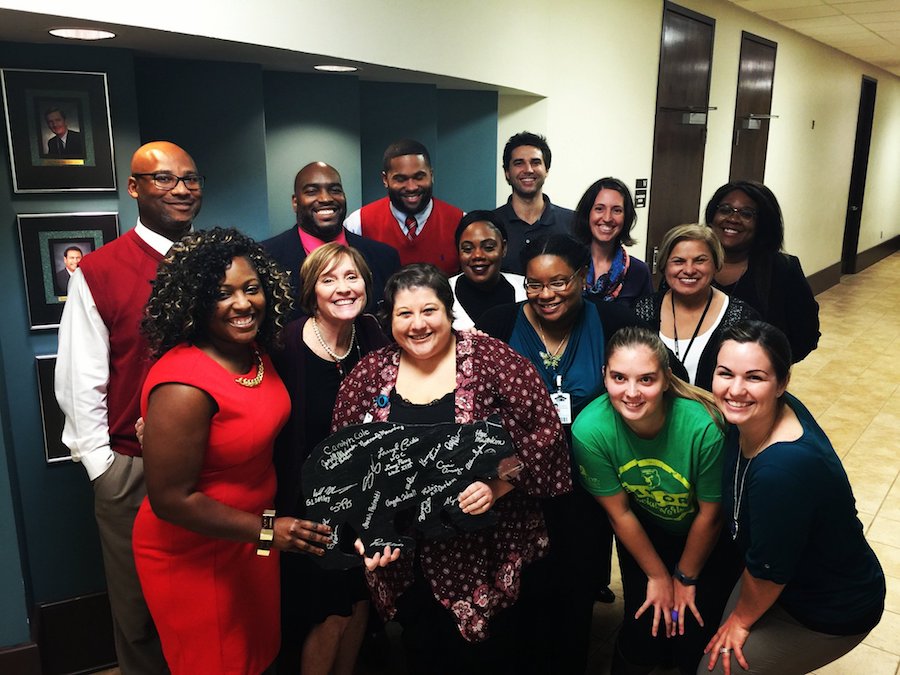WISD Students to Benefit from Mental Health Grant

GSSW Receives New Grant to Provide Additional Mental Health Services at Waco ISD
The Hogg Foundation for Mental Health has awarded the Garland School of Social Work a $235,000 grant to expand programming aimed at addressing the mental health and wellness needs of students in the Waco Independent School District. The grant will be used to address the needs of students placed in disciplinary alternative education programs.
With a grant partnership already in place with WISD through the Be Emotionally Aware and Responsive (BEAR) Project, this new program will work in tandem with BEAR, said Carrie Arroyo, LCSW, lecturer in the School of Social Work, who will co-direct the initiative with BEAR Project Manager Carolyn Cole, LMSW.
“We are excited about these additional funds to help us go deeper and wider in our work with the district, especially around mental health and wellness,” Carrie said.
Through the work of the BEAR Project at the G.L. Wiley Opportunity Center, Waco ISD’s alternative campus, the GSSW recognized that a high number of these students have mental health needs that are unaddressed, lacking treatment and often misunderstood by campus personnel who are not trained in mental health, Arroyo said.
The Hogg grant will fund the GSSW’s Transitioning to Mental Wellness: Improving Academic Achievement through Mental Health program. Within the context of the education setting, the GSSW has been able to show that academic achievement is tied to mental health and wellness. With that in mind, the Transition to Wellness project has set forth seven goals:
1.Conduct initial mental health intake screening and assessments for students who are placed at the Disciplinary Alternative Education Program (DAEP) to identify, plan, treat and appropriately refer these students for mental health services.
2.Increase mental health wellness for all students transitioning in and out of Waco ISD’s DAEP campus (G.L. Wiley).
3.Craft customized and individualized transition plans with attention to appropriate cultural and linguistic needs when students return to their home campuses in effort to increase mental wellness, academic success, and to decrease recidivism back to the Disciplinary Alternative Education Program (DAEP).
4.Evaluate and revise student transition plans and district-wide training process (including materials, content, and delivery skills) annually, and throughout the program implementation process.
5.Reduce recidivism rate to DAEP by 15 percent, in-school suspensions by 10 percent, and out-of-school suspensions by 10 percent by the end of the grant period.
6.Engage campus staff, administration, parents and community stakeholders in 18 trainings annually district-wide to educate them on the importance of trauma-informed care, mental wellness, social emotional learning, cultural responsiveness and their links to academic achievement and evidence-based best practices.
7.Provide learning opportunities for MSW Research Assistants with field internships offering culturally sensitive practice to promote mental wellness. These skill sets will enable social work graduates to enter the workforce as culturally competent mental health professionals.
“We are hoping to increase the campuses’ capacity to effectively serve students through a trauma-informed and culturally sensitive lens as well as increase academic success of students through identifying and addressing mental health needs,” Carrie said.
Dean Jon Singletary said, “We are excited about the opportunities this new grant presents at the intersection of education and mental health. The Garland School of Social Work is committed to the health and well-being of the children in our community. We are dedicated to helping teachers and students remove barriers to academic success, and this gift will do exactly that. A gift like this can lead to radical change in the lives of children who participate in a program of this nature.”
By Nikki Wilmoth